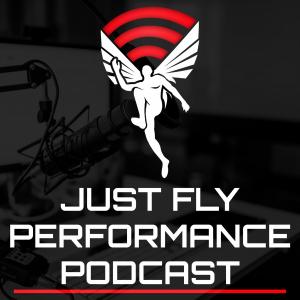Just Fly Performance Podcast

335: Danny Foley on Dialing Between a Fascial or Muscle Emphasis in Training
Today’s episode features Danny Foley. Danny is a performance coach and Co-founder of Rude Rock Strength and Conditioning. He is well known for his investigation into fascial training concepts, and is the creator of the “Fascia Chronicles”. Danny has spent the previous six years as the head strength and conditioning coach at Virginia High Performance, where he specialized in working with Special Operations Command (Naval Special Warfare Development Group) personnel. Through his work at Virginia High Performance, Danny has become very proficient working with complex injuries and high performing athletes within an interdisciplinary setting. The complexity of the human body, and how it moves in sport, will never cease to amaze me. Humans are “cybernetic” organisms, or “systems of systems”. Each system is connected to the others in the body. Perhaps the epitome of that idea of inter-connectedness, as it refers to movement, is on the level of the fascial system, which is the web of connective tissue lying below the skin. The fascia is laid out in both linear and spiraling lines, which fit with the demands of athletic movement on the linear and rotational level. When we see the way the fascial lines form in the body, or consider the principles of tensegrity in various architectural structures, or a dinosaur’s neck, for example, there is an instant and powerful connection that forms in regards to how this system must help power our movements. At the same time, it’s easy to take things to extremes, as the fascia clearly needs muscle to create pressure and pull. For today’s episode, performance coach and fascial training expert, Danny Foley takes us into an informative deep dive on what the role of the fascia in movement is, how to understand when relatively more muscle or fascial dynamics may be at play in powering movement, and how to train in a way that can tap into the fascial system to a greater degree (although as Danny clearly mentions, the two systems are inextricable). This was a really informative and practical conversation that offers a lot of insight to any coach, athlete or human mover. Today’s episode is brought to you by SimpliFaster, Lost Empire Herbs, and the Elastic Essentials online course. For 15% off your Lost Empire Herbs order, head to lostempireherbs.com/justfly. To try Pine Pollen for FREE (just pay for shipping), head to: justflypinepollen.com View more podcast episodes at the podcast homepage. Timestamps and Main Points: 4:56 – What got Danny interested in the role of fascia in training in the first place 10:00 – To Danny, what the difference between “functional” and “fascial” training is from a terminology perspective 15:42 – How we might train differently because of the existence of fascial lines in the human body 22:47 – Danny’s thoughts on older athletes return to “functional training” after doing more intense training in their high-performance years 26:25 – Discussing some propositions regarding fascial training, and what may or may not be true in regards to what really engages that connective system 32:07 – Looking at how to adjust the “dial” between more connective tissue/fascial oriented training, and more muscle-oriented training methods 40:34 – How to actually measure improvement in regards to the quality of the fascial system 50:14 – More information on the unique connective characteristics of fascia, such as sensation and proprioceptive elements 54:12 – Thoughts on balance training in light of the fascial systems 1:01:48 – Why the absence of predictability is extremely important to the training process 1:16:34 – A summary of what defines fascial oriented training vs. more “muscular” oriented training “When you are working with (special forces) you realize that a lot of conventional stuff isn’t conducive to that personnel” “If it weren’t for (the marketing factor), I would just say connective tissue instead of the...






 Visit Podcast Website
Visit Podcast Website RSS Podcast Feed
RSS Podcast Feed Subscribe
Subscribe
 Add to MyCast
Add to MyCast